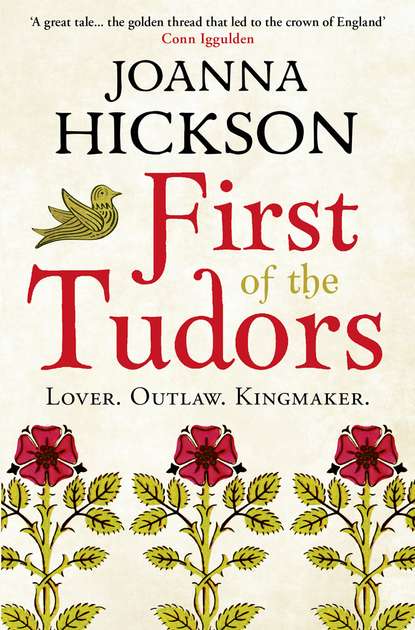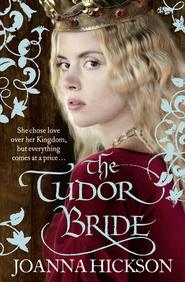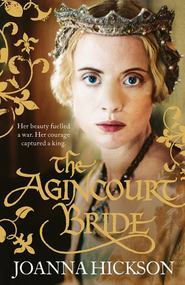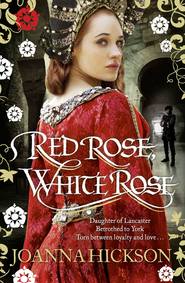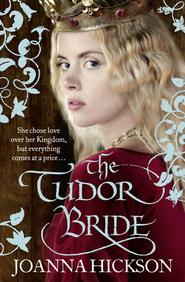По всем вопросам обращайтесь на: info@litportal.ru
(©) 2003-2024.
✖
First of the Tudors
Настройки чтения
Размер шрифта
Высота строк
Поля
I touched the cloth, admiring its shimmer as the slight movement stirred it into life; it was soft and sinuous under my fingers. I imagined the deft fingers that had wound the fine gold wire around the warp fibres with infinite skill and patience. Edmund was right; wearing it would make anyone feel illustrious. Cloth of gold! Just how had Edmund come up with the huge price it commanded?
Edmund drew himself up to his six-foot height. ‘The daughter of a queen may wear what she likes. They would not dare to fine her.’
Exasperated, I flicked the fabric so that it rippled, like a sudden flurry on a calm lake. ‘Your head is in the clouds, brother. Come back to earth. Our sister lives in Tun Lane, London. Nobody knows what we know. In her world she is not Margaret, just Meg, and she is about to marry the man of her choice who is not a prince but a lawyer. She will be a wife and, God willing, a mother. She is happy, with a warm home and enough money for her needs. Whatever you dream for your own future, do not wish it on her.’
Irritably Edmund twitched the length of fabric into his arms, gathering it in like a shield against reality. ‘I know what she is – what she has chosen to remain – but she is still the daughter of a queen, the granddaughter of a king, and I will give her the honour of royal raiment, even if she never wears it.’
I shrugged. ‘So be it but you have wasted your money. And do not dare to reveal her true birth by so much as a whisper at the wedding or you will win Mette’s enduring wrath – and mine too for that matter.’
My brother paused in his careful folding of the cloth-of-gold. ‘Mette – is she still alive then?’
Unlike me, Edmund no longer went to The House of the Vine in Tun Lane where our sister had lived since the death of our royal mother fourteen years ago. In recent years he had acquired what I considered an exaggerated sense of rank and the refuse-strewn back streets of London offended him.
‘Of course she is alive. You know she is. She always asks after you, as does our sister.’ Mette was Meg’s foster mother, the faithful servant into whose care our own mother had entrusted her little daughter on her deathbed, hoping she might enjoy the happy childhood she herself had not known. Our mother was one of many children of the sixth King Charles of France and the ravages of the king’s madness had had consequences for them all in the fierce struggle for power that resulted. Now Meg was to marry her foster brother William, who had recently qualified as a lawyer at the Middle Temple. A spring wedding at St Mildred’s church.
‘And what do you tell them?’ Edmund asked as he laid the cloth on top of his chest, which stood next to mine against the wall in our chamber in one of the many towers of Westminster Palace.
‘I tell them you are well. That is all.’
Edmund’s chest was filled with apparel of every kind. I had wondered before how he managed to afford such finery since he received the same royal pension as I did. I presumed he must be winning at dice or frequenting the moneylenders of Lombard Street, like many of our fellow squires. I hated debt and could do without fashionable clothes, preferring to buy harness and armour if I had any spare funds but I did quite envy the dashing figure Edmund cut about the court.
‘You are coming to the wedding, are you not?’ I added. My query contained a note of anxiety for Edmund could be unreliable.
‘Of course I am coming. I would not miss a feast.’ A smile revealing perfect teeth lit his dark features – another advantage he enjoyed, my own smile being marred by a chipped front tooth, the result of an unhappy collision in a joust. ‘What are you giving her?’
I felt the blood rush to my cheeks. A tendency to blush was one of the drawbacks of having red hair and a fresh complexion. There was no reason to feel ashamed of my gift, yet I knew Edmund would think it niggardly. ‘A hogshead of ale.’
‘Ale?’ He was incredulous. ‘You are giving them ale?’
‘Yes, the traditional Bride Ale, strongly brewed and flavoured with herbs and honey, for all the guests to drink their health.’
Edmund grimaced and flicked back his glossy hair. ‘Oh well, I daresay there will be wine as well. After all, their name is Vintner. There are plenty of wine merchants in the family.’
* * *
Meg and William Vintner were married at St Mildred’s church in the London ward known as the Vintry, the same church that had witnessed the nuptials of his parents more than twenty years before. As the bride and groom stood in the porch making their vows, I studied the face of the woman who had brought them both up. Mistress Guillaumette Vintner, known to close friends and family as Mette, was now a matron of sixty-three years, stout and wrinkled in her wimple and veil to which, on formal occasions such as this, she added a widow’s barbe to mark her lone status since the death of her husband Geoffrey several years before. They had enjoyed seventeen happy years of marriage before he had succumbed to congestion of the lungs and once or twice I saw her gaze wander wistfully off towards the churchyard where he lay buried. The bridegroom, their only son William, had been what she called their ‘autumn leaf’, the last fruit of their fertility before the sap began its winter retreat, and no one could have been more delighted than Mette when the relationship between William and Meg changed from the affection of siblings to the attraction of adults. Probably Geoffrey had foreseen their future together too before he died. Somehow it seemed inevitable. Meg had been Queen Catherine’s secret bequest to the woman who had been her wet nurse as a babe and whom she had come to regard as a true mother.
Owen Tudor stood beside Mette. Father to Edmund, Meg and me and still handsome, with his silver hair and ruddy complexion, he had travelled from the Welsh March for the occasion. I knew he still practised regularly with sword and bow, which kept his physique that of a man ten years younger than the fifty he had lived and I admired him for it. Nor did he appear to have lost any of his ability to charm the ladies; more than once he caused Mette to blush and smile at his whispered comments as the short ceremony progressed. He also aimed a sly wink at Edmund and me, which I returned but which made Edmund hiss through his teeth. I think my brother would rather it had been our mother, Queen Catherine, who survived to attend the wedding, instead of the Welsh squire she had married in secret and to whom she had borne four children. Edmund was the eldest. Our younger brother Owen, the child born shortly before our mother passed away, was now a monk at Westminster Abbey and had taken another name.
Edmund’s wedding gift was wrapped in plain linen and draped over his shoulder. He was clad in a bright green damask doublet lined with scarlet, the sleeves dagged and his hose parti-coloured, one leg white and one yellow. The sight had attracted startled glances as we walked from the inn to the church.
‘Why do they stare like that?’ he had grumbled. ‘Have they never seen dagged sleeves?’
‘It might be your legs rather than your arms,’ I responded. ‘A short doublet and hosen like that are rarely seen in London streets.’
‘And no wonder,’ he declared, stepping gingerly over small piles of animal droppings and rotting vegetables. ‘I thank Saint Crispin that I thought to wear bottins rather than shoes.’
After the wedding Mass we walked in procession to Tun Lane, behind a group of beribboned minstrels who rivalled Edmund for colourful apparel and played merry tunes to set the mood. A spectacular array of wafers and pastries was laid out in the panelled hall at the House of the Vine and we were promised a feast of roasted meats when the banquet began. As I kissed the bride and groom and wished them well I noticed that my hogshead of Bride Ale stood in pride of place below the salt, ready for folk to fill their jugs at will. Meg thanked me warmly for it and while other guests gathered around the barrel Mette took me off to sit with her by the hearth. People were taking their places at the cloth-draped boards decked with spring garlands and their flowery scent vied with the smell of yeast and herbs as the ale flowed. Casting a scathing glance at the hogshead, Edmund wandered off to find some wine to drink.
‘That was a very thoughtful gift, Jasper,’ Mette said, ‘just what every wedding needs to get the conversation flowing. It is so good to see you – and Edmund too of course, although I barely recognized him. I must say his taste in clothes has taken an exotic turn!’
I laughed at that. ‘Still not mincing your words then, Mette? Of course at court Edmund’s style is hardly remarkable. It is mine which stands out as being rather bland.’
The old lady perused my best blue doublet with its grey coney trimming. ‘You both look as you choose,’ she commented tactfully. ‘And I hear the king favours sober dress. Are you still happy at court? Not swamped by the ceremony or daunted by the protocol?’
‘No, we have our duties and the company is fair. Plenty of other squires to spar with and the food is good.’ I grinned at her. ‘Better than at the abbey!’
After our mother’s death, our parents’ marriage became known and our father had been imprisoned for contravening the Marriage Act. Edmund and I had found refuge with the nuns at Barking Abbey on the Thames outside London, living among a group of young royal wards being educated there. Only when our half-brother, King Henry, reached his majority was our father released and we were brought into Henry’s own household, where tutors and instructors were engaged to prepare us for knighthood, a process which was now approaching its conclusion. It had been a change of lifestyle much appreciated by both of us.
Mette’s rheumy eyes crinkled. ‘Ha! I can imagine. And damsels? Does the queen keep a charm of goldfinches in her solar to delight the young men at court?’
‘She does, but none outshines her. It must be owned that Queen Marguerite is dramatically beautiful. They say that her dark eyes and skin are inherited from her Spanish grandmother.’
Mette sniffed and leaned forward to speak in a confidential whisper. ‘And that does not endear her to the English, especially as she has not yet produced an heir to the throne. As your mother knew only too well, in a queen beauty is no substitute for fertility. Besides Queen Marguerite is actually French, whom the English dislike even more than the Spanish, or the Welsh for that matter.’
‘Which is the very reason I am careful to avoid revealing my doubly unpopular origins.’ I shot her a wry look. ‘You are French, Mette. Have you found the English much prejudiced against you?’
Her smile was reassuring and rather nostalgic. ‘No, but I live very quietly now. Your lady mother did though – very much so; but then if she had not she would never have married Owen Tudor and retired into obscurity – and you would not have been born.’
‘Did I hear my name? Are you gossiping about me, Madame Mette?’ My father had approached the hearth and with his usual gallantry removed his rakishly feathered hat, bowed over Mette’s hand and kissed it.
She responded with a broad smile and a raised eyebrow. ‘From what I hear you do not need me to spread gossip about you, Master Tudor.’
My father looked affronted. ‘Now what are they saying in the city? None of it will be true of course.’
I pricked up my ears. Unless invited to attend the king, our father wisely avoided the royal palace these days, but when he was in London I often met him in one of the taverns clustered around Westminster Hall, where the courts of justice sat. Any rumour Mette had picked up would have come through her lawyer son William.
She gave Owen a stern look. ‘They say you are making the most of your new appointment as King’s Forester in North Wales; working your way through the poor widows of Denbighshire.’
Owen gave a loud hoot of laughter and his deep brown eyes, so like my brother Edmund’s, danced with delight. ‘I told you there would be little truth in what you heard. Is it likely that I would take up with any poor widow, Mette? I may have dallied with one or two rich ones – nothing more I assure you.’ With a polite display of reluctance he released her hand. ‘But you have no refreshment I see. At the risk of heaping more fuel on the flames of rumour, let me play your cupbearer and bring you a draught of the Bride Ale.’
Mette accepted his offer with alacrity and watched him cross the floor on his quest. Turning back to me she murmured confidentially, ‘After all, why should he not seek consolation where he can find it, Jasper? He is still a handsome man – but there is no woman alive that could ever fill the space in his heart left by your beautiful mother, so sadly taken from us, we all know that.’ As she spoke I spied a nostalgic tear escape her eye. She went on, ‘I see her face every time I look at Meg. I cannot think why the world does not recognize the truth of her birth. And yet I thank God it does not.’
I cast a glance at the bride and groom standing in the centre of the room, pledging their love in a shared cup. At twenty-one William Vintner was an affable and good-looking young man. Only a few weeks younger than Edmund, he was quick of wit and slow of ire, neither tall nor short with a sturdy build, curly brown hair and rosy, clean-shaven cheeks. He bore a strong resemblance to his genial father, a man I had greatly admired, but his beard did not yet sprout thick enough to warrant letting it grow as Geoffrey Vintner had. I was less than a year younger than William and in our infancy at Hadham Manor he, Edmund and I had been close playmates, but my brother seemed to have forgotten that. Out of the corner of my eye I saw Edmund leaning elegantly against the hangings, alone, sipping from a horn cup, his gaze sweeping the other guests with an unfathomable expression. He had yet to congratulate the young couple, or give them his gift.
Our sister was slim and fair with delicate features, deep blue eyes and a countenance of doll-like sweetness, which I knew concealed a strong will and a generous nature. If it were true that she closely resembled our mother then I cursed the weakness of my memory, which retained no clear image of Queen Catherine to compare her with. I had been six when she rode away from Hadham Manor, never to return. Only six years old when our lives turned upside down, and while I could remember every detail of the island in the River Ash where we three little boys had played at knights and outlaws, to my deep regret I had no recollection of the lovely face of our mother – the fifth King Henry’s widowed queen and Owen Tudor’s late and much lamented wife. I knew that somewhere in Windsor Castle there was a portrait of Catherine de Valois, painted when she was a princess of sixteen and sent to the conquering King Henry as a marriage-bait, but as yet I had not found it.
Mette was enjoying her ale, raising her cup to the bridal pair, when Edmund moved out from behind a knot of guests, ushering a servant who carried a joint-stool and spread it open to place it before the bride and groom in the centre of the hall. On it, with a ceremonial bow, my brother laid his wedding gift, still wrapped in its protective linen shroud. The room hushed expectantly as he stepped forward to kiss his sister, then, taking a proud stance beside the stool, he cleared his throat to speak. Although my stomach lurched with dread of what he might say, I thought what an impressive figure Edmund made despite the garish nature of his clothing, darkly handsome, with all the grace and sinew of a noble horseman.
‘Like all here, I have come to wish the bride and groom health, wealth and happiness in their life together. This gift is for the beautiful bride, so that she may array herself like a queen and show the world her true worth.’
With a deft movement he pulled off the linen wrapping and flung the exposed cloth-of-gold across his raised arm in a dramatic flourish. Beams of light falling through the open hall shutters reflected off its folds and illuminated the faces of the surrounding guests, who stood open-mouthed at the spectacle. Edmund’s expression was one of triumph as he anticipated Meg’s response.
She cast a troubled glance at her new husband, whose brow creased in concern at the threat of revelation contained both in the shimmering fabric and in Edmund’s words. Apart from the Vintner family, Owen, Edmund and I, no other guests in the room had any notion of Meg’s true birth and it was the family’s intention that it should remain that way. Edmund’s gift and his style of presentation had rendered the secret more fragile than ever.
After a pause Meg stepped forward and gathered the material off her brother’s arm, laying it carefully over the stool, from which it hung in liquid folds, pooling on the floor like molten metal. Her gauze veil, secured by a coronet of spring flowers over her fair, profusely curling mane of hair, frothed around her smiling face as she dropped Edmund a graceful curtsy.
‘Thank you, Edmund,’ she said, and stretched up to kiss his cheek. ‘It is a fabric of spectacular beauty – a vision of heaven in fact – and, with your permission, I shall donate it to the Queen of Heaven herself, to fashion a gown for the statue of the Virgin in St Mildred’s church, in gratitude for her blessing on our marriage today.’





